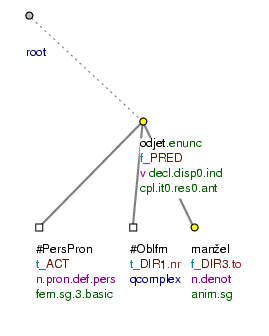- Definition of the
DIR3functor -
The
DIR3fnctor (directional: to) is a functor for a free modification that specifies the direction (it answers the question "where to?"), i.e. it expresses the target point of the event.
Subfunctors. The DIR3 functor is further specified by subfunctors. See Section 13.1.6, "The subfunctors with the DIR3 functor".
Valency. DIR3 modifications are obligatory for many verbs, esp. for verbs of motion with the prefix do-, na-, při- and v- (e.g. doběhnout (=to_run_in), doputovat (=to_reach sth. by travelling), nahnat (=to_drive), namontovat (=to_install), přijít (=to_come), přičlenit (=to_annex), vhodit (=to_insert/throw_in), vklouznout (=to_slip_in)). With verbs of movement with the prefix pře-, DIR3 modifications are obligatory together with DIR1 modifications (přemístit (=to_relocate), přesadit (=to_transplant), přesídlit (=to_resettle)). With some verbs, obligatory DIR3 modifications alternate with obligatory LOC modifications (e.g. odevzdat knihy v knihovně.LOC (=lit. to_hand_in (the) books in (a) library) / do knihovny.DIR3 (=to (a) library)).
Forms. The basic forms of DIR3 modifications are:
-
prepositional phrase.
The most common forms:
blízko+2 Položil to blízko vázy. (=He put it near the vase.) do+2 Odešel do města. (=He left for a city.) do čela+2 Do čela kandidátky se nedostal. (=He did not get to the lead of the ballot.) doprostřed+2 Polož to doprostřed stolu. (=Put it in the middle of the table.) k+3 Postav se k němu. (=Stand to him.) mezi+4 Dal to mezi stůl a gauč. (=He out it between the table and the couch.) mimo+4 Oba důstojníci byli postaveni mimo službu. (=Both officers were put off duty.) na+4 Vydali se na Spořilov. (=They set off to Spořilov.) nad+4 Pověs ten obraz nad televizi. (=Hang the painting over the television.) na roveň+2 Postavil ženu na roveň muži. (=He made a woman equal to a man.) po+4 Voda mi sahá po kolena. (=Water is reaching my knees.) po+6 Házel po něm kamením. (=He was throwing stones at him.) pod+4 Schoval se tedy pod deštník. (=Thus he hid himself under an umbrella.) poblíž+2 Položil knihu poblíž postele. (=He put a book close to the bed.) proti+3 Postavila se proti zrcadlu. (=She stood opposite the mirror.) před+4 Vyšli před dům. (=They went out of the house.) přes+4 Rám přesahuje přes konstrukci. (=The frame reaches over the construction.) směrem k+3 Usedl směrem k oknu. (=He sat down toward the window.) směrem proti+3 Usedl směrem proti oknu. (=He sat down opposite the window.) tváří v tvář+3 Hleděl tváří v tvář problému. (=He was facing up to a problem.) vedle+2 Zaparkoval auto vedle garáže. (=He parked the car next to the garage.) za+4 Uklidil koště za skříň. (=He put the broom away behind the wardrobe.) za+7 Přišli jsme si pro rozhovor za spisovatelem. (=We came for an interview to a writer.) Example:
Odjela za manželem.
DIR3(=lit.(She) left for (her) husband.) Fig. 7.22 -
noun in a non-prepositional case.
The most common forms:
instrumental Pohled tímto směrem přináší mrazivá zjištění. (=The look in this direction brings a chilling discovery.) -
adverbial expressions.
Examples:
Kam.
DIR3jdete? (=lit. Where are_(you)_going?)Pryč.
DIR3s nimi! (=lit. Away with them!)Pojďte dál.
DIR3(=lit. Come in.)Odjedeme daleko.
DIR3(=lit. (We) shall_go far_away.)Cesta se točí doleva.
DIR3(=lit. (The) path winds (to) (the) left.)Sestoupili dolů.
DIR3do údolí. (=lit. (They) descended down to(the) valley.)Byly sem.
DIR3svezeny z celých severozápadních Čech. (=lit. (They) were here driven from (the) whole (of) Western Bohemia.)S vámi jdeme kamkoliv.
DIR3(=lit. With you (we) will_go wherever.)Nikam.
DIR3se nepůjde. (=lit. Nowhere - (one) will_go.)Pověsil lampu příliš nízko.
DIR3(=lit. (He) hung (the) lamp too low.) -
dependent clause.
The most common forms:
kam Dej to, kam nedostane. (=Put it where he cannot reach.) NB! Dependent locative and directional clauses are usually introduced by relative adverbs, not by conjunctions.
Dej to, kam.
DIR3se nedostane.DIR3(=lit. Put it where (he) cannot reach.)Ukliď to <tam> , kam.
DIR3to patří.DIR3(=lit. Put it there where it belongs.)In some cases, in which the dependent clause is introduced by a pair of pronominal adverbial expressions with different meanings, the effective root node of the dependent clause is assigned the
RSTRfunctor. Example:Vrať to tam.
DIR3, odkud.DIR1jsi to vzal.RSTR(=lit.Put_back it there where (you) - it took.)For details see Section 5.3.4, "Correlative pairs with temporal pronominal adverbs as supporting expressions".
Agreeing form of an adjective. With nouns denoting events (nouns ending with -ní and tí; see Section 2.4.3.3, "Functors assigned to the non-valency modifications of nouns referring to events"), DIR3 modifications can also be expressed by agreeing forms of adjectives.
Example:
zpětné.DIR3 získání celého podílu (=lit. retrogressive acquisition (of) (the) whole share)
Borders with other locative or directional functors. DIR3 modifications border on other locative or directional functors. For details see Section 4.4, "LOC".
Border with the INTT functor. The DIR3 functor can also border on the INTT functor (intention, see Section 5.5, "INTT"). For details see Section 5.5.1, "Borderline cases with the INTT functor ".
